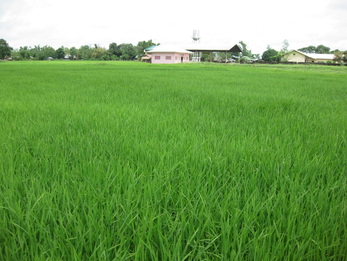 Productive rice farms in Nueva Ecija. (Photo by Pokus - Gitnang Luson)
Productive rice farms in Nueva Ecija. (Photo by Pokus - Gitnang Luson) “Imported rice from Vietnam and other countries are not helping us but actually undermining our capacity to produce our own rice. If farmers face indebtedness and become land less, lands devoted to cultivating rice are to decline, putting us more dependent on imported rice. Our food security is systematically degraded,” Aquilino Lopez, vice-chairperson of AMGL for external affairs and chair of Amgl – Nueva Ecija.
The groups said that during pre-WTO period of the data from Bureau of Agricultural Statistics (BAS), imported rice only shared 2% of the total 41 million metric tons rice supply from 1990 to 1994, but jacked up to about 10% of 226.8 million metric tons supply from 1995 to 2012. It is also noticeable that pre-WTO period rice buffer reached to 21% that plunged to only 17% since WTO entry. Thus, food security in rice was concretely degraded. The groups said that the continuation of this trend would make the region and the country critically dependent on rice imports.
“Isn't in dense that our country's has the 8th largest rice production in 2009 but also imported the most in the world in 2010. The country's policies and program are weakening our agriculture, thus, no different from putting the people into hunger and misery,” Lopez said.
The farmers are criticizing the statement of National Food Authority (NFA) regional director Amadeo De Guzman that the Vietnamese rice offloaded at Subic freeport was to augment the local supply in the region. But the groups said that this totally contradicts the agency's mandate of supposedly promoting and protecting the locally-produced food supply. The groups said that the Nueva Ecija province contributing the most among provinces at 9% of total produced palay in 2013 and Central Luzon contributing the biggest among regions more than 18% of the total produced palay are considered as country's rice granary but are being flooded by imported rice.
“The BS Aquino government, like its predecessors, the Dept. of Agriculture and NFA are drumming up rice self-sufficiency when it only means increasing rice imports and totally opposing rice food security. This government abandoned protecting local production and diverting the country to becoming import-dependent on food, when an international crisis erupts disrupting importation, we are all going to die of starvation,” Lopez said.
The government obliged itself to import 350,000 metric tons of imported rice last year as commitment to the WTO according to the Dept. of Trade and Industry (DTI). The groups also claimed that the 50,000 metric tons of smuggled rice reported by the Bureau of Customs (BOC) to the senate investigation last January is adding salt to the wound.
“Smuggling is just a symptom of liberalizing agriculture. The neo-liberal policies of WTO are supposed to implement the free-flow of goods, cancelling out state intervention, especially tariffs, thus, smuggling is just the advanced phase of trade liberalization. Fundamentally, we demand the revocation of government's effort to liberalization of agriculture and commitment to the WTO,” Lopez said.
Instead, the farmers groups demanded the implementation of genuine land reform to emancipate poor farmers from local landlords and traders monopolizing the rice industry. The government should fulfill its duty to support and subsidy to local rice production as what other countries have implemented.
“We should oppose liberalization of agriculture and WTO as they only means starvation and misery for the people of Central Luzon,” Lopez said. #
 RSS Feed
RSS Feed
